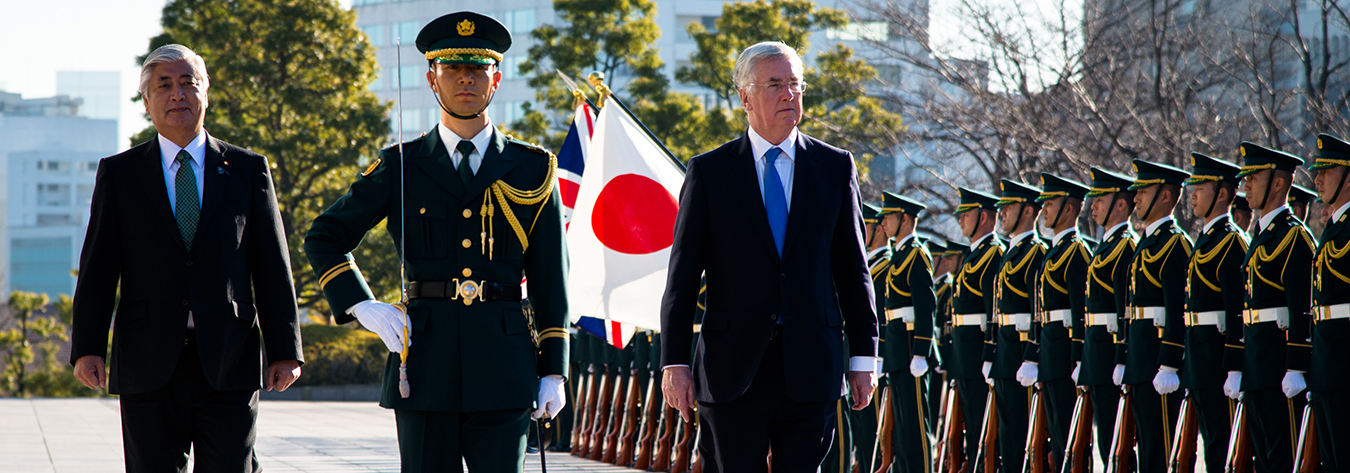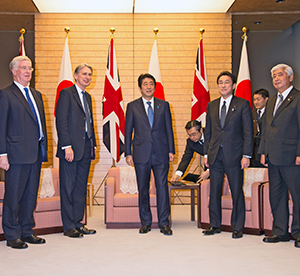
Prime Minister Shinzo Abe (centre) met (from left) ministers Michael Fallon, Philip Hammond, Fumio Kishida and Gen Nakatani.
With an increasing number of threats to global security, ranging from land disputes and piracy to climate change and cyber terrorism, these are uncertain times. Perhaps it is not surprising then that the UK and Japan are further boosting their already strong security and defence partnership, including through 2+2 meetings, so called since they involve the defence and foreign ministers of both countries.
First held in London in January 2015 and described by Michael Fallon, secretary of state for defence, as an initiative that “clearly reaffirms our resolve to deepen and broaden our defence relationship”, the second 2+2 meeting was hosted by Tokyo last month. In attendance were Fallon, Philip Hammond, secretary of state for the Foreign and Commonwealth Office, and their counterparts Gen Nakatani, minister of defence, and Fumio Kishida, minister of foreign affairs.
In a statement after the meeting, the four welcomed the progress in bilateral cooperation during 2015. The UK recognised Japan as its closest security partner in Asia, and welcomed the country playing a greater role on the world stage based on the principle of international cooperation. Meanwhile, Japan said it would welcome a greater presence by the UK in the Asia–Pacific region.
“The long-term security of both the UK and Japan depends on upholding a stable international system”, according to Hammond. “We will continue to work closely together to contribute to global prosperity, peace and security.
“The UK and Japan are close allies. We enjoy a strong, historic relationship, based on common values and support for democracy, the rule of law, human rights and open markets”, he added, pointing out that it is more important than ever for the UK to work with allies such as Japan to counter global threats.
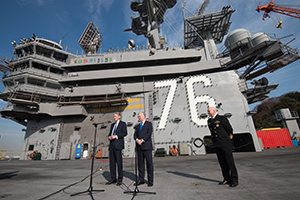
UK ministers visited the Japan Maritime Self-Defense Forces ship in Yokosuka.
The most recent of these is North Korea’s launching a satellite into space on 7 February and its nuclear test conducted on 6 January, which reportedly topped the meeting’s agenda.
“[Kishida, Yun Byunge-se, South Korea’s minister of foreign affairs, and I have] agreed that Britain, Japan and South Korea will work together with other partners and the United Nations to ensure that such a violation of global norms receives the united global response that it requires”, said Hammond.
Also of concern to the ministers at the 2+2 meeting were the maritime disputes in the East and South China Seas that, they said, should be resolved peacefully in accordance with international law and the principles of freedom of navigation and overflight. The necessity of international cooperation in counter-piracy operations off the coast of Somalia and in the Gulf of Aden was also discussed, as well as the importance of addressing climate change due to its impact on global security and prosperity.
Closer to home, the ministers declared plans to intensify consular cooperation to ensure the safety of British and Japanese nationals in times of international crises, and events such as the Rugby World Cup 2019 and Tokyo 2020 Olympic and Paralympic Games. Work related to counter terrorism and cyber security at the latter event is also to be undertaken jointly.
Cooperation is not only at a high level but, in recent months, there have been a growing number of exchanges and joint training exercises involving the Japan Self-Defense Forces and the British Armed Forces. According to the ministers, this work is set to go on and include “continuing joint exercises on mine sweeping in the Gulf, considering cooperating to improve amphibious capability, and improving counter-IED (improvised explosive device) capability”.
Deputy joins UK team
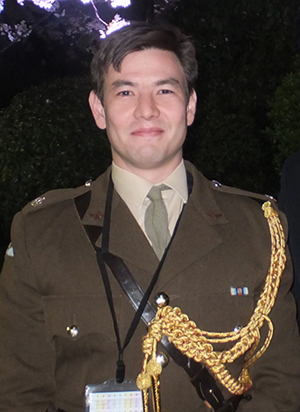
Tosh Suzuki, deputy defence attaché
A further result of these strengthening ties has been the creation of two defence posts in Japan. In 2015, Commander Simon Staley was appointed to work in Yokohama as the first UK–Japan Royal Navy liaison officer in over 90 years (see page 20). Meanwhile, in 2014 at the British Embassy Tokyo, Major Tosh Suzuki began work as the deputy defence attaché. Interestingly, at the same time, in the Embassy of Japan in London, a counterpart role was created—and filled by Major Tatsuya Moritake.
“The UK and Japan both stepped up their commitment”, Suzuki told BCCJ ACUMEN, adding that a deputy from the ground forces was sought to widen the background and connections of the team.
Having been deployed to Afghanistan only four months after being commissioned from Sandhurst as an officer in the Parachute Regiment, Suzuki brings solid operational experience—as well as an academic background—to the role. Yet, he is a strong believer in teamwork.
“At every level, as a planner you need to draw off the experience of the people around you, particularly the soldiers”, he said. “The Parachute Regiment motto is Ready for Anything [Utrinque Paratus]. We are the first to be deployed, with other forces following”.
Suzuki’s deployment, therefore, ranged from undergoing intense fighting with insurgents to providing peacekeeping and other humanitarian support. In Afghanistan, he explained, either scenario might occur within a matter of minutes, resulting in the need to be extremely flexible and adaptable.
After completing three tours over a total period of 14 months, he was temporarily released to take up the position in Tokyo. With a degree in economics and Chinese from the University of Leeds as well as Japanese language skills and cultural understanding—his father is Japanese; his mother is British—Suzuki admits the new role is a “good fit”. His work in the regiment, while incredibly important, he said, was localised, unlike his current role.
“Being able to gauge the environment that we are in and influence those interactions with policy-makers and high-level decision-makers is really exciting”, he said. “The region is so important, not just for security but also for the economy—which are intrinsically linked”.
Trade routes are a classic example, he said, given that traffic will be decreased if piracy is prevalent, thereby stunting economic activity. According to Suzuki, since the end of World War II, the region’s security has resulted in the development of nine of the world’s most prosperous ports, the tiger economies and the passing of £2trn worth of trade through the South China Sea.
With a trade-based economy, Japan relies on freedom of navigation, open sea lines of communication, and the current stability, he said. Given that, like Japan, the UK is an island nation relying on a rules-based international security system to trade, Suzuki believes the two countries can work together well.
“In many ways, Japan’s aspiration for defence and how it is looking at the world is quite similar to the UK”, he said, adding that although there is no monopoly, the UK’s model could be especially suitable for Japan.
Among other areas, the UK is offering experience in carrying out operations, working with the US as a partner, and combating counter-terrorism.
“We’re also hoping to work with Japan in capability development, in areas that are useful to them, such as disaster relief and humanitarian aid”, Suzuki explained.
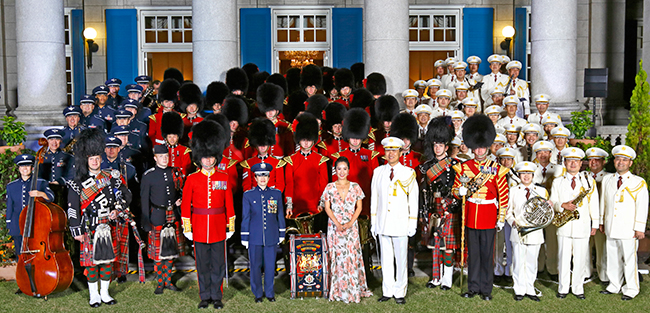
Military bands representing Japan, the US and the UK performed at the British Armed Forces Day event in October.
Special event for forces
Celebrating the strong ties among the three countries was the reason for the third British Armed Forces Day event at the British Embassy Tokyo on 14 October 2015. Red, white and blue lights shone on the pillars of the ambassador’s residence as the countries’ military bands dazzled the defence community.
British Ambassador to Japan Tim Hitchens CMG LVO addressed more than 200 guests representing 20 countries.
“This evening is dedicated to all our allies and partners: to our friendship and the future”, he said, adding that “the UK is 100% behind Japan’s policy of greater engagement in world security”.
According to Suzuki, who attended the event, the collaboration is symbolic of the countries’ wider relationship. “The US is a very close ally of the UK and Japan—and it is practical to involve the US in work with Japan”, he said.
Each band played music that reflects their national heritage. The Japan Ground Self-Defense Force Central Band’s performance included taiko drumming, while the US Air Force Pacific–Asia Showcase Band played renditions of jazz and blues.
Living up to its reputation as a world-renowned marching ensemble, the Band of the Coldstream Guards moved in intricate formations on the lawn. As a nod to their Scottish roots, their performance also featured the bagpipes and traditional highland dancing.
For the finale, the bands came together to perform Amazing Grace and their national anthems, led by Major Simon Haw MBE, director of music for the Band of the Coldstream Guards.
“There was a real spirit of friendly cooperation this afternoon [during rehearsals]”, Haw told BCCJ ACUMEN. “They all coped with the sequence very well and it shone through in their performance tonight.
“The theme is very worthy and it is ideal to use music as a medium to pull that together: it’s a universal language”, he added.
Haw was leading the band—one of the oldest in the British army—on a 10-day concert tour of Japan following 10 days in Seoul. The band later went on to perform at an international music festival in Shanghai and at events in Beijing.
Dr Rachel Smith, a full-time flautist in the band, took up the position in 2001. Her role has taken her all over the world, including six visits to Japan.
“I love coming here—the food, the culture, the people”, Smith told BCCJ ACUMEN. Speaking of the event she said, “I think its pretty important to be linking things together … everyone has so much to bring to the table and we can learn a lot from each other”.
Suzuki agrees: “It was an opportunity to acknowledge the past, recognise the change that has happened, and look towards the future together”, he said. “It’s very important for us to engage with the international defence community. Through engagement, we develop understanding. By doing this, we can cooperate more easily, building relationships and trust”.
Given the current global political, social and economic climate, that is arguably more important than ever.
